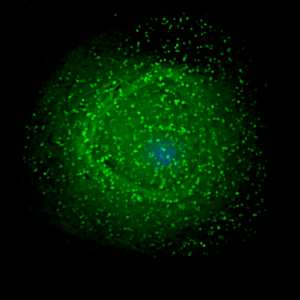One of the challenges with eliciting broadly neutralizing antibodies (bnAbs) which target HIV is that they have unusual characteristics which may be hard to elicit after vaccination including long antigen recognition loops. Researchers , led by James Binley, have identified an anti-HIV bnAb which has a normal antibody recognition loop length. This antibody may be easier to elicit in a vaccine and therefore learning how this antibody acquired neutralization breadth may aid in the development of an HIV vaccine.
Broadly neutralizing antibodies are one of the main focuses of HIV vaccine design research because they are able to neutralize HIV isolates across the different subtypes. This characteristic is important for a global vaccine. However, these antibodies take years to develop in natural HIV infection due to extensive somatic hypermutation. bnAbs are also rare in that they have very long recognition loops which allow them to penetrate the dense glycan shield of the HIV Envelope and bind to their epitopes. This makes them theoretically difficult to elicit after vaccination.
Therefore, researchers searched for an antibody with more “normal” antibody characteristics which was also broadly neutralizing. They used virus-like particles that present HIV trimers to probe memory B cells from a donor with broadly neutralizing antibodies in their serum. They isolated a monoclonal antibody lineage which they named N90-VRC38. This lineage had broad antibodies which had common antibody recognition loop lengths. They also solved the structure of antibodies from this lineage in complex with an HIV V1/V2 loop scaffold protein. The crystal structure revealed that the antibodies bound to their epitope through side-chain interactions. This allowed the antibodies to penetrate the dense glycan shield of the virus to reach their epitope despite having a short loop.
In summary, these data suggest that broad antibodies which target HIV can be produced without having unusual, hard to achieve characteristics. Therefore, immunogen design may need to focus on eliciting such responses.
Journal article: Cale et al., 2017. Virus-like Particles Identify an HIV V1V2 Apex-Binding Neutralizing Antibody that Lacks a Protruding Loop. Immunity
Article by Thandeka Moyo












